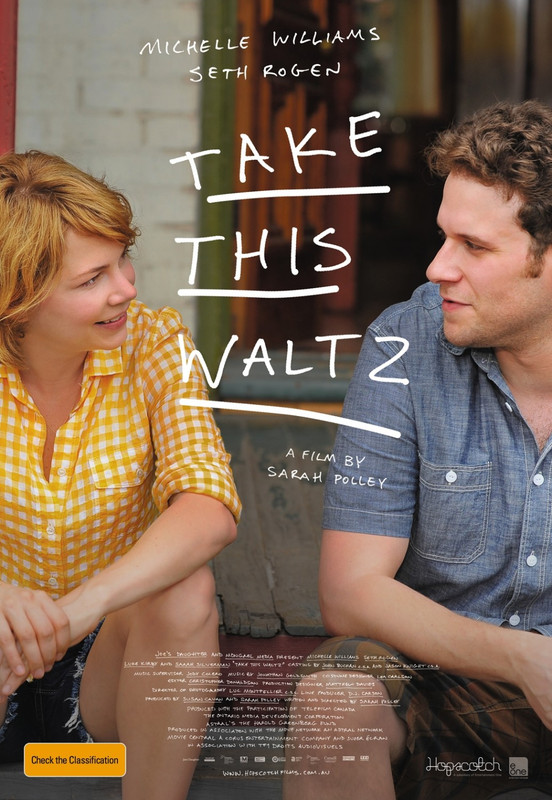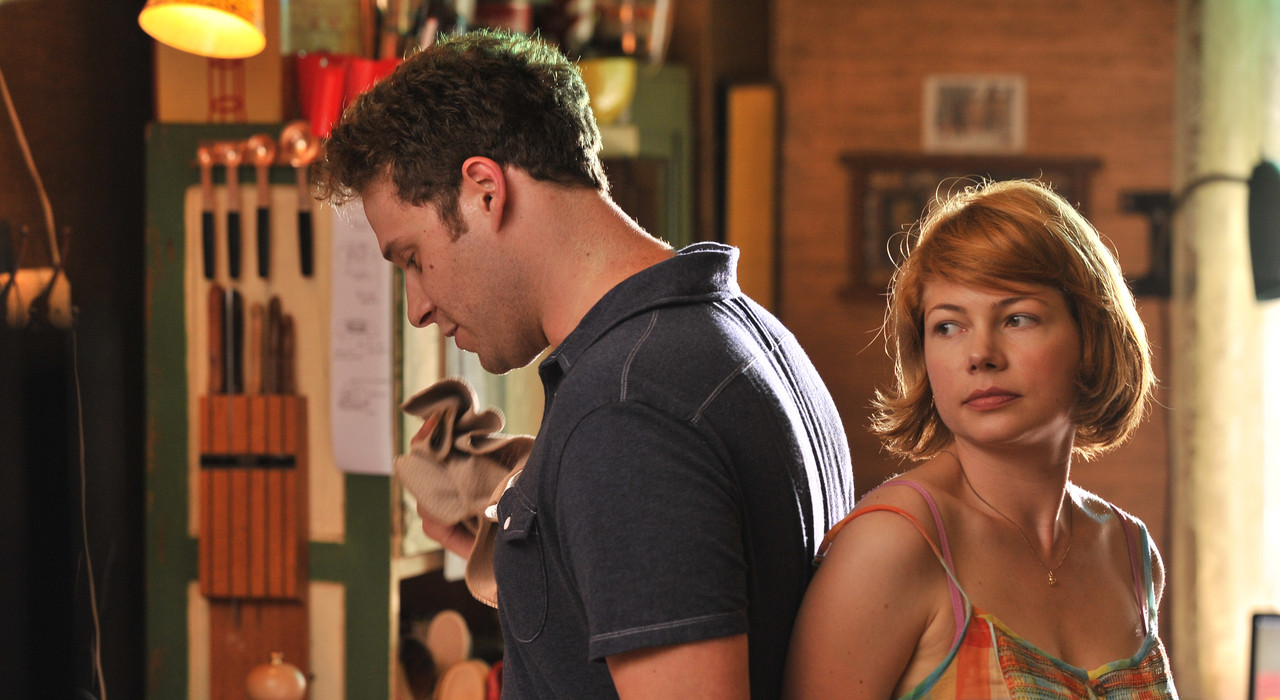Dir: Sarah Polley
I'm pretty sure I first saw Sarah Polley when the TV show Ramona was shown on Saturday mornings in the early 90s, but it was only later, when I saw The Sweet Hereafter, that I became aware of what a fine actress she was, and became a big fan. That fandom carried over into my admiration for her debut as writer/director, Away From Her, a deeply moving film whose insight into a forty year marriage being changed by Alzheimers disease seemed all the more remarkable given that it had come from someone who was just 28.
It's been quite a wait for Polley's follow up, thanks largely to the vagaries of financing and releasing a small, personal and - at times anyway - refreshingly adult film. Having gone much beyond her own experience with her first film, Polley seems to stick closer to home with Take This Waltz, painting an intimate portrait of a married couple in their late twenties (Michelle Williams and a cast against type Seth Rogen) and the disconnections and dissatisfaction that undermine their relationship, largely by threatening to lead Williams' Margot into a relationship with rickshaw driving neighbor Daniel (Luke Kirby).
The film basically divides in two, looking at Margot as she relates to her caring, if slightly dull, husband Lou (Rogen) at home, and her burgeoning attraction to and almost dalliance with Daniel. It's proper, and surely Polley's intention, that these two relationships and the scenes that they occupy feel completely different from one another, but that's also the film's central problem. The difference in feeling between the two halves of the film goes beyond story and character to the tone and the feel of the film itself. There is such an intimate, real, observed feel about Margot and Lou's relationship, and that feeling never once carries through into the scenes between Margot and Daniel, which all seem written and stiffly delivered (one mortifying scene over Martinis rings utterly false).
Michelle Williams' performance suggests that this is probably exactly the way Polley wanted these respective scenes to be. She plays differently off each of her main scene partners, and I suspect that people will be divided on which side of the film they prefer depending on how they end up seeing the respective relationships (neither of which is idealised). For me it was the scenes between Margot and Lou that rang true and hit hard. Their scenes are quiet, and we never see them as a truly happy couple, but as they each struggle to connect there are vestiges of the relationship they are looking to recapture, you can feel the history, and why these people got together in the first place. What dominates these scenes though is a sense of quiet devastation, of watching something silently implode in slow motion.
This is made all the more devastating by the excellent performances from Williams, who, ludicrous as the notion seems, is utterly convincing when she tells her husband of five years that it takes all her courage to try to seduce him. Looking at the likes of The 40 Year Old Virgin, Superbad and The Green Hornet I was skeptical that Rogen could pull off a real dramatic performance, and while 50/50 went some way to proving he can act, I still didn't expect anything like this from him. Rogen is stripped of all his safety nets; he has almost no jokes here and is cast in what could be seen as a weak character, but what he gives us is an honest portrait of a man who is so comfortable with his love for his wife he doesn't notice their struggle to connect. This comes home in scenes like the anniversary dinner at which Lou is perfectly content with the fact that he and Margot can't find anything to talk about. The real standout moment though is a series of close shots of Rogen at the beginning of the third act, playing entirely on Lou's face as the moment we've been expecting, and he really hasn't, arrives.
The problems, for me, come in the other side of the film. I don't quite buy into Margot and Daniel's connection for a few reasons... Daniel's kind of a douchebag; full of himself, somewhat rude and generally irritating. He also seems much less exciting than Margot and (perhaps) the film seem to find him. Perhaps the major niggle for me is that, as much as I thought that these scenes felt much more scripted, and that Luke Kirby's performance always felt like an act (perhaps intentionally, like he's putting on a show for Margot, but that never quite rings true either), I'm not sure it matters who Daniel is. The central point of interest here for me was the slow collapse of this marriage, and I don't know that we even need more than the inference of who the guy causing it is, the fact of Margot's restlessness is really the important thing, and most of the scenes between her and Daniel just feel like stilted plot advancement.
This isn't to say that nothing on this side of the film works. One scene in which Margot and Daniel visit a funfair is an effective version of the whole film in miniature, as they are swept up in the moment on the ride as Video Killed the Radio Star booms out and lights flash around them, only for the moment to be suddenly lost when the ride and the music abruptly stop. This is one of a few moments that Polley effectively echoes at different points in the film (a scene of Williams sitting on the toilet echoes in a surprisingly affecting way). There also good things on the margins, notably a brief performance from Sarah Silverman, effective as Margot's sister in law. Silverman is funny and real as a recovering alcoholic, though - while I can see what Polley's saying with it - I'm not sure the film needs the shower scene with her, Williams and Jennifer Podemski.
You can't fault the ambition or the craft that Polley displays. Even when scenes don't work (a rather crassly explicit montage towards the end) they are impeccably crafted (that same montage covers several months and phases of a relationship in what seems to be a continuous circular pan). The other really striking thing here is how Polley seems to completely refuse to take sides. I wish I'd seen this with someone, because I can imagine the discussions about whether the film wants Margot to be with Lou, with Daniel, or whether it just sees her as a mess who'll end up doing this same thing over and over being passionate and interesting, because whatever you think about that question you can definitely something to support your take in the film. I think Daniel's a douchebag, but does the film? I'm not sure. Some might argue that this is a weakness; a sign of a writer and director who is unsure of what she's saying, that's rubbish, it's one of the great aspects of the film that it refuses to draw easy caricatures, that it refuses to have good guys and bad guys, it recognises that life is more complicated than that.
For all my frustrations with it my biggest problem with Take This Waltz is that I wish desperately it were all as good as its finest moments, because at times Polley, Williams and Rogen get to a place of devastatingly raw truth (Rogen's speech about a long term joke hit really hard for me). The other thing that niggles at me about it, and makes me think that it may be better as a whole than I think it is right now, is that I suspect that if I come back to the film in five or ten years, perhaps at a different place in my life, maybe even when I'm in a relationship, it will play differently and that other things will ring true for me that maybe didn't this time. At the very least Sarah Polley has made a provocative and intelligent film that will make you think and make you feel something, there are really too few of those about and, whatever its problems (and they'll likely be different for every viewer) this one should not be missed.
★★★☆☆



No comments:
Post a Comment